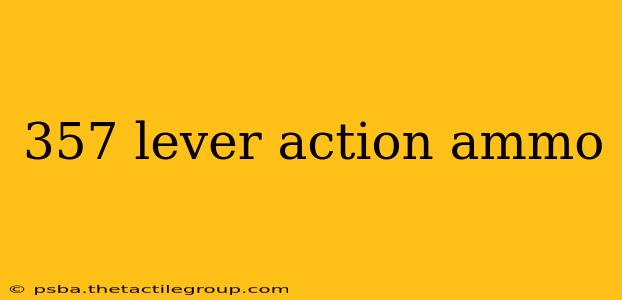The .357 Magnum cartridge, renowned for its stopping power and versatility, enjoys a rich history, especially within the lever-action rifle platform. This guide delves into the specifics of .357 lever action ammo, exploring its capabilities, uses, and considerations for responsible firearm ownership.
Understanding .357 Magnum in Lever Guns
The .357 Magnum's popularity in lever-action rifles stems from its potent performance and manageable recoil. Many shooters appreciate the ability to use the same ammunition in both a handgun and a rifle, offering flexibility and cost-effectiveness. This shared ammunition characteristic makes the .357 lever action a practical choice for various applications.
Advantages of .357 Lever Action Ammo:
- Stopping Power: The .357 Magnum delivers significant stopping power, making it effective for self-defense, hunting small to medium-sized game (like coyotes and hogs, depending on bullet choice and shot placement), and pest control.
- Versatility: The ability to use the same ammo in both a handgun and rifle adds to its practicality. This shared ammunition allows for ease of carrying and simplifies logistics.
- Relatively Low Recoil: Compared to larger calibers like .44 Magnum, the .357 Magnum produces less recoil in a lever-action platform, making it more manageable for shooters of various skill levels.
- Wide Ammo Availability: .357 Magnum ammunition is readily available at most sporting goods stores and online retailers, ensuring accessibility for reloading and purchasing.
Disadvantages of .357 Lever Action Ammo:
- Range Limitations: While powerful at close to medium ranges, the .357 Magnum's trajectory and energy drop-off become more pronounced at longer distances, limiting its effectiveness for long-range shooting.
- Recoil Sensitivity in Lighter Rifles: Lighter lever-action rifles might exhibit more noticeable recoil with the .357 Magnum, affecting accuracy and shooter comfort.
- Potential for Overpenetration: The .357 Magnum's power also means a potential for overpenetration, especially with full metal jacket (FMJ) bullets, underscoring the critical need for safe handling and proper shot placement.
Choosing the Right .357 Lever Action Ammo:
Selecting the appropriate ammunition depends heavily on the intended application.
Bullet Types:
- Full Metal Jacket (FMJ): These bullets are often chosen for practice or target shooting due to their affordability. They penetrate deeply, but may lack the stopping power of other options for hunting or self-defense.
- Jacketed Hollow Point (JHP): Designed for self-defense and hunting, JHP bullets expand upon impact, delivering greater stopping power and reducing overpenetration.
- Soft Point (SP): A hunting bullet type that expands reliably and delivers good energy transfer to the target.
Grain Weight:
The grain weight of the bullet impacts the projectile's velocity, energy, and trajectory. Heavier bullets generally have flatter trajectories but lower velocities, while lighter bullets have higher velocities but may experience more trajectory drop.
Safety Considerations with .357 Lever Action Ammo:
Always prioritize firearm safety. Proper handling, storage, and understanding of your firearm's mechanics are paramount. Familiarize yourself with the rules of safe gun handling, including:
- Always treat every firearm as if it were loaded.
- Keep your finger off the trigger until ready to shoot.
- Point the firearm in a safe direction.
- Be aware of your target and what is beyond it.
- Store firearms securely and out of reach of children.
Conclusion:
The .357 Magnum remains a potent and versatile cartridge for lever-action rifles. Understanding its capabilities, limitations, and the various ammunition options ensures a safe and enjoyable shooting experience. Remember that responsible gun ownership involves continuous learning and practice to maintain proficiency and safety. Always consult reputable sources and seek professional guidance when necessary.

